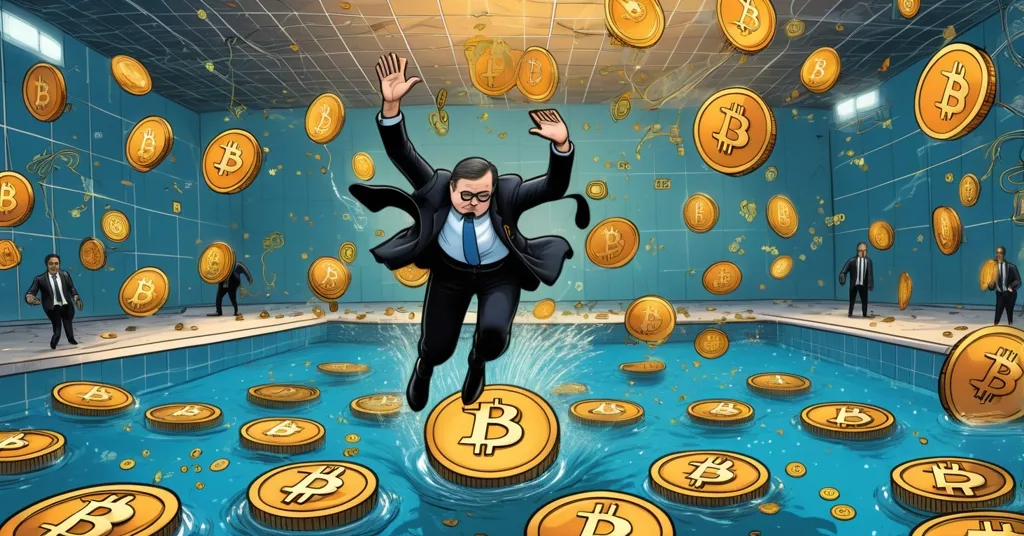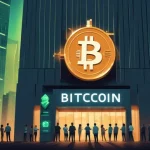Brazil’s Top Official Reaffirms Bitcoin Reserve Plan Amid Global Trend

Brazil’s Top Official Doubles Down on Bitcoin Reserve Plan
Pedro Guerra, chief of staff to Brazil’s Vice-President Geraldo Alckmin, has reaffirmed his commitment to adding Bitcoin to Brazil’s sovereign reserves, signaling a significant shift in how the nation views digital currencies.
- Guerra advocates for Bitcoin in Brazil’s reserves.
- Proposal supported by Congressman Eros Biondini’s bill.
- Stresses need for a governance framework.
- Brazil’s digital infrastructure supports this move.
Pedro Guerra isn’t just dabbling in the crypto waters; he’s doing a full-on cannonball into the Bitcoin pool. During the recent inauguration of the parliamentary “Competitive Brazil Front,” he proposed that Brazil should seriously consider including Bitcoin in its sovereign reserves. Unlike some who might be chasing the latest fad, Guerra argues that Bitcoin, having survived sixteen years of rigorous global testing, represents a robust monetary network worthy of national attention.
This proposal aligns with a bill introduced by Congressman Eros Biondini in 2024, which would permit the Central Bank of Brazil and the National Treasury to hold Bitcoin alongside traditional assets like gold and foreign currency. Guerra isn’t just throwing around ideas; he’s pushing for a detailed governance framework that tackles the nuts and bolts of custody, disclosure, and risk metrics. After all, if you’re going to play with the big boys of finance, you better know the rules.
Brazil’s digital infrastructure isn’t playing around either. With successful initiatives like PIX, an instant payment system, and the Drex wholesale CBDC pilot, the country has shown it can handle the digital financial heavy lifting. Guerra points out that if the United States Treasury can hold confiscated Bitcoin and debate its management publicly, Brazil—a G20 economy with a sophisticated payments stack—should at least be evaluating a strategic allocation.
But let’s not get too starry-eyed about this. Guerra is quick to clarify that Bitcoin, CBDCs, and altcoins are “three entirely different animals.” He’s not just jumping on the crypto bandwagon; he’s advocating for a specific asset he believes could serve as an intergenerational store of value. With Brazil’s dollar reserves currently earning negative real yields—meaning the money is losing value over time—the allure of a hard-capped digital asset like Bitcoin is hard to ignore.
In the coming weeks, Guerra plans to brief Vice-President Alckmin and relevant cabinet members on this proposal. And while Bitcoin was trading at $84,631 at the time of this discussion, the real value might just be in the long-term purchasing power it could bring to Brazil’s future generations.
“We’re not talking about a hypothetical experiment; Bitcoin has survived sixteen years of open-source adversarial testing.” – Pedro Guerra
“If the United States Treasury can hold confiscated bitcoin and publicly debate how to manage it, Brazil—a G20 economy with a sophisticated payments stack—must at least evaluate whether a strategic allocation makes sense.” – Pedro Guerra
“Three confusions dominate in Brasília… They are three entirely different animals.” – Pedro Guerra
“If we’re proud of hosting COP 30 and speaking of future stewardship, preserving purchasing power for the next generation is part of that duty.” – Pedro Guerra
“Currency is a national symbol; it must have purchasing power.” – Gustavo Franco (cited by Pedro Guerra)
Brazil’s interest in Bitcoin as part of its sovereign reserves isn’t just a flash in the pan. It reflects a broader global trend where nations are exploring digital assets to diversify their reserve portfolios and hedge against economic volatility. With a history of hyperinflation and a keen eye on future stewardship, Brazil’s move could set a precedent for other countries to follow.
However, it’s not all sunshine and rainbows. The devil is in the details, and the primary challenge lies in establishing a clear governance framework, particularly around custody and risk management. While there is some skepticism within the government, the main focus of criticism is on the practical implementation rather than the concept itself. Critics argue that the volatility and regulatory uncertainties surrounding Bitcoin could pose significant risks to national reserves.
On the flip side, the potential benefits are tantalizing. Bitcoin’s 21-million-unit limit and its censorship-resistant settlement layer could make it an ideal intergenerational store of value, addressing Brazil’s public-investment gap and the negative real yields on its dollar reserves. This aligns with the country’s long-term economic stewardship goals, especially as Brazil prepares to host COP 30 and take on a leadership role in global sustainability efforts.
But let’s not kid ourselves—Bitcoin isn’t the holy grail of finance. It’s a tool, and like any tool, it can be misused. Scammers and fraudsters lurk in the shadows, ready to exploit the unwary. Yet, for a nation like Brazil, with its history of economic turbulence and a desire to innovate, Bitcoin represents a bold step towards financial resilience and sovereignty.
So, as Guerra gears up to brief Vice-President Alckmin, the question remains: Will Brazil take the plunge into Bitcoin reserves, or will it remain on the sidelines? Only time will tell, but one thing is clear—Brazil is not just talking about the future; it’s actively shaping it.
Key Questions and Takeaways
What is Brazil’s government stance on including Bitcoin in its sovereign reserves?
Pedro Guerra, chief of staff to Vice-President Geraldo Alckmin, actively supports the inclusion of Bitcoin in Brazil’s sovereign reserves, emphasizing its potential as a strategic asset. This aligns with a bill introduced by Congressman Eros Biondini, indicating government interest in exploring Bitcoin as part of its reserve strategy.
How is Brazil planning to implement a Bitcoin reserve strategy?
Brazil is considering a governance framework that addresses custody, disclosure, and risk metrics for any Bitcoin reserve strategy. The government may submit comments on the Biondini bill or propose an alternative framework, and think-tanks are encouraged to model optimal position sizing relative to the $350 billion reserve portfolio.
What distinguishes Bitcoin from CBDCs and altcoins according to Pedro Guerra?
Pedro Guerra emphasizes that Bitcoin, CBDCs, and altcoins are fundamentally different. He argues against lumping Bitcoin together with other crypto assets, equating it to CBDCs like Drex, or reducing it to just blockchain technology.
What are the potential economic benefits of including Bitcoin in Brazil’s reserves?
Guerra suggests that Bitcoin could serve as an intergenerational store of value due to its 21-million-unit limit and censorship-resistant settlement layer. This could help address Brazil’s public-investment gap and the negative real yields on its dollar reserves, aligning with the country’s long-term economic stewardship goals.
What challenges does Brazil face in implementing a Bitcoin reserve strategy?
The primary challenges include establishing a clear governance framework, particularly around custody and risk management. While there is some skepticism within the government, the main focus of criticism is on the practical implementation rather than the concept itself.



